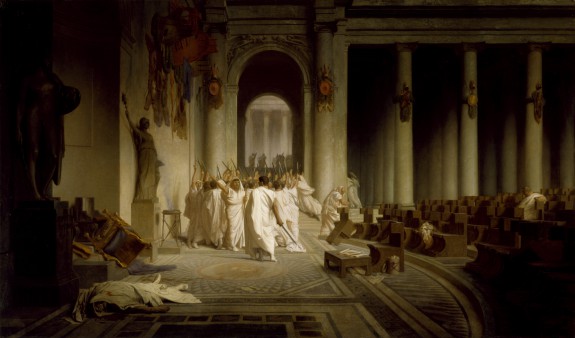Twenty three stab wounds was all it took to take down one of the most powerful leaders in Roman history. Despite being hailed as a powerful war hero in history, Julius Caesar was murdered in his own city by his own people on the Ides of March 44 B.C.E.1 Gaius Julius Caesar was born on July 13, 100 B.C.E. in Rome, and became dictator of the Roman Republic in October 49 B.C.E. The powerful image of Caesar even today cannot be compared, and that is why his legacy is still alive today. He was an ambitious figure that conquered modern day France, led the civil war, and influenced the fall of the Roman Republic. The Roman Republic before its fall served the wealthy and the privileged.2 Caesar did not want to do away with the Republic despite what critics say; all he wanted to do was reform it and give more power to the people. Members in the Senate, however, would not allow this. Julius Caesar’s assassination cannot be justified; it was treason and murder, even though those who murdered him defended their actions as tyrannicide.

The conspirators were not from outside forces of Rome; instead, they were from Caesar’s inner circle of elite senators. Caesar entrusted Brutus and Cassius to be his eyes and ears in the Senate, but they did just the opposite. Brutus, who was pardoned by Caesar after helping Caesar’s foe Pompey during the recent civil war, was one of the masterminds behind the assassination. In 44, Caesar appointed Brutus as proprietor of Gaul, or modern day France, which was one of the highest offices a nobleman could hold.3 Cassius, another conspirator who had been pardoned by Caesar at the beginning of his dictatorship, was also one of the masterminds behind the assassination. Repeatedly, Caesar seems to have contributed to his own death by pardoning those who did not deserve to be pardoned. Instead of dealing harshly with his enemies, he pardoned them and kept them close. He took the saying keep your enemies close to an extreme, since they ended up close enough to assassinate him.
In some ways, the conspirators who plotted against Caesar’s life had a clear justifiable reason in mind. The conspirators defied Caesar’s authority and perceived him to be a popular leader who threatened their privileged interests. They truly believed they were saving the Republic. They wanted to restore republican liberties that Caesar had robbed from them.4 For example, Caesar completely disregarded their unwritten constitution and the Roman mos maiorum, or ancestral customs, when he appointed commoners to offices that only aristocrats could hold. He was defying their unspoken and unwritten rule that commoners cannot be placed in charge.5 Doing away with Caesar would do good to the people of Rome; therefore, tyrannicide was justifiable in their eyes. And so their treasonous act will forever be remembered as the most infamous assassination in history.

Although some of his actions were faulty, Caesar did not deserve to die in the treacherous way that he did. Murder consists of three things and the conspirators held all three of them, which is intent, malice, and premeditation. The conspirators intended to kill Caesar before he left for Parthia on March 18, 44 B.C.E.6 The raid on Parthia would cause Caesar to be away for months on end, so the conspirators had to act quickly. They premeditated their attack before Caesar left by taking into account time, numbers, and politics. They knew Caesar would be unaccompanied and surrounded by Senate members such as themselves. They also knew that only Senate members were allowed inside the Senate chambers, prohibiting any outsiders Caesar usually surrounded himself with.7 Their malice was proven in the gruesome way Caesar was left on the steps of the Senate building. Together, they marched to the Senate, with daggers under their white togas, with intent, malice, and premeditation to kill Julius Caesar. Before Caesar’s assassination, every senator had to sign an oath in which they promised to maintain Caesar’s safety. The penalty for violating the oath was the death penalty.8 The Senators involved almost got away with murder, but Octavian, Caesar’s nephew and successor, and Marc Antony, Caesar’s best friend, hunted the assassins down one by one and avenged his murder.
- Encyclopedia Britannica, 2015, s.v. “Julius Caesar,” by Arnold Joseph Toynbee. ↵
- Michael Parenti, The Assassination Of Julius Caesar: A People’s History Of Ancient Rome (New York: The New Press, 2004), 47. ↵
- Encyclopedia Britannica, 2015, s.v. “Marcus Junius Brutus,” by E. Badian. ↵
- Parenti, The Assassination Of Julius Caesar: A People’s History Of Ancient Rome, 2. ↵
- Parenti, The Assassination Of Julius Caesar: A People’s History Of Ancient Rome, 3. ↵
- Barry Strauss, The Death of Caesar: The Story of History’s Most Famous Assassination (New York: Simon & Schuster, 2016), 54. ↵
- Greg Woolf, “Et Tu Brute? : Caesar’s Murder and Political Assassination” (London: Profile Books, 2006), 45. ↵
- Strauss, The Death of Caesar: The Story of History’s Most Famous Assassination, 51. ↵



49 comments
Timothy ODekirk
This was an extremely interesting article indeed. I always found thee assassination of Julius Caesar to be rather interesting. I also found it disturbing how the people closest with Cesar truly wanted him dead. This was betrayal at it’s most extreme and this betrayal may of acted as the influence for many related betrayals in movies and tv shows.However, despite the unjustifiable betrayal of Julius Caesar, it is definitely good to know that justice was served and Caesar’s successors and friends hunted his murders down one by one until justice was fully served. This was an intriguing article about the betrayal of Julius Caesar
Caroline Bush
Great article! I didn’t know much about Julius Caesars death so this article was really interesting to me. I never knew that the reason why Caesar was killed was because of his desire to give me more power to the commoners and allow them in positions of power reserved only for aristocrats. The fact that these intentions were seen by the elite as a threat is tragic even more tragic is that Caesar was killed by he vary men he pardoned. Its ironic that Caesar was killed by keeping his enemy’s so close that he could easily be stabbed in the back by them.
Lauren Castillo
Thank you so much. Your article was so helpful in filling in my notes. I also got to read about his betrayal in your article. We learned about it in class but your article added a little more drama and a lot more detail. You article made Julius Caesar sound like a decent man who died just trying to have faith in people. Who would have thought.
Samuel Stallcup
When I was in seventh grade, I was a Caesar Salad for Halloween, and I dressed up as a Roman leader, Julius Caesar, and then put some lettuce on me. My dad suggested we put a knife in my back, but I didn’t understand the story. After he told me, I told him it was kinda funny. Anyway, the way you, the author, explained this famous backstabbing was great because you gave concrete details and used clear language. Nice article!
Clarissa Bustamante
Julius Caesar was a well known powerful leader in history. Your article was very good and how you mentioned the reasons as to why his enemies decided to assassin him. But it is upsetting how the ones he kept close were the ones who betrayed him and deceived him in an extremely wrong way. It seems as if he tried to give all people of Rome more chances to succeed, which may have been an unjust decision.
Megan Barnett
I remember reading and watching the movie about Julius Caesar in high school but I was able to understand the story so much better just by reading this article. I always thought Caesar was the bad guy but this article was in a point of view that defended him, which I found as a very interesting way to present the story. Starting off with the action was also a great way to get my attention and I am sure it caught the eyes of a lot of other readers as well.
Kelley Salinas
Julius Caesar was one of the most well-known powerful leaders in history. It was interesting to find out that Caesar pardoned people that should not have been pardoned in that first place, thus leading to his down fall. This article gave a great view into the reasons why his close enemies decided to assassin him. Great article over one of the most infamous assassinations in history.
Mario Sosa
An interesting article! The subject of Julius Caesar’s assassination is familiar to me, but I never knew why he was killed or what became of his assassins. I always assumed that Julius Caesar was a powerful tyrant who wanted more power to himself, but it seems it was quite the opposite. It is a shame that he was killed because his own senate members did not like him giving more power to his people. This was a great read, good job!
Nicolas McKay
This was a very interesting article Edelia. I knew about this event because of the Shakespearean play of the same name. Each of the characters in the play are certainly different than how you portray them in your article. I had always believed he was a tryrant, and was surprised to learn how merciful he was towards his enemies and how willing he was to give power to the people. It is a shame his mercy ended up becoming his downfall.
Nahim Rancharan
Julius Caesar is seen as one of the most powerful and ruthless leaders in history and this article clearly highlights this fact. I was quite fascinated by the arguments presented about the assassination of Julius Caesar, especially by the fact that people that were from his own inner circle betrayed him and killed him. Additionally, it provides a great insight as to how his killers justified their actions behind their motive of restoring control and balance to the rightful rulers (the elites/privileged) of the Roman Republic. The story of Julius Caesar’s death proves that it is truly one of history’s most infamous assassinations. This article was a very interesting read. Great Job!